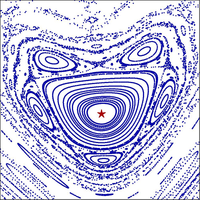当前位置:
X-MOL 学术
›
Phys. Rev. X
›
论文详情
Our official English website, www.x-mol.net, welcomes your feedback! (Note: you will need to create a separate account there.)
Slow Quantum Thermalization and Many-Body Revivals from Mixed Phase Space
Physical Review X ( IF 12.5 ) Pub Date : 2020-03-04 , DOI: 10.1103/physrevx.10.011055 A. A. Michailidis , C. J. Turner , Z. Papić , D. A. Abanin , M. Serbyn
Physical Review X ( IF 12.5 ) Pub Date : 2020-03-04 , DOI: 10.1103/physrevx.10.011055 A. A. Michailidis , C. J. Turner , Z. Papić , D. A. Abanin , M. Serbyn

|
The relaxation of few-body quantum systems can strongly depend on the initial state when the system’s semiclassical phase space is mixed; i.e., regions of chaotic motion coexist with regular islands. In recent years, there has been much effort to understand the process of thermalization in strongly interacting quantum systems that often lack an obvious semiclassical limit. The time-dependent variational principle (TDVP) allows one to systematically derive an effective classical (nonlinear) dynamical system by projecting unitary many-body dynamics onto a manifold of weakly entangled variational states. We demonstrate that such dynamical systems generally possess mixed phase space. When TDVP errors are small, the mixed phase space leaves a footprint on the exact dynamics of the quantum model. For example, when the system is initialized in a state belonging to a stable periodic orbit or the surrounding regular region, it exhibits persistent many-body quantum revivals. As a proof of principle, we identify new types of “quantum many-body scars,” i.e., initial states that lead to long-time oscillations in a model of interacting Rydberg atoms in one and two dimensions. Intriguingly, the initial states that give rise to most robust revivals are typically entangled states. On the other hand, even when TDVP errors are large, as in the thermalizing tilted-field Ising model, initializing the system in a regular region of phase space leads to a surprising slowdown of thermalization. Our work establishes TDVP as a method for identifying interacting quantum systems with anomalous dynamics in arbitrary dimensions. Moreover, the mixed phase space classical variational equations allow one to find slowly thermalizing initial conditions in interacting models. Our results shed light on a link between classical and quantum chaos, pointing toward possible extensions of the classical Kolmogorov-Arnold-Moser theorem to quantum systems.
中文翻译:

混合相空间中的慢量子热化和多体复兴
当混合系统的半经典相空间时,少数体量子系统的弛豫在很大程度上取决于初始状态; 即,混沌运动区域与规则的岛共存。近年来,人们进行了很多努力来了解经常缺乏明显的半经典限制的强相互作用量子系统中的热化过程。时变变量原理(TDVP)允许人们通过将单一的多体动力学投影到弱缠结的变分状态的流形上,系统地得出有效的经典(非线性)动力学系统。我们证明了这种动力学系统通常具有混合相空间。当TDVP误差较小时,混合相空间在量子模型的精确动力学上留下了足迹。例如,当系统在属于稳定周期轨道或周围规则区域的状态下初始化时,它将表现出持久的多体量子复兴。作为原理上的证明,我们确定了新型的“量子多体疤痕”,即在一维和二维相互作用的里德堡原子模型中导致长时间振荡的初始状态。有趣的是,引起最强劲复苏的初始状态通常是纠缠状态。另一方面,即使当TDVP误差很大时,如在热化倾斜场Ising模型中一样,在相空间的规则区域中初始化系统也会导致令人惊讶的热化速度降低。我们的工作将TDVP建立为一种识别具有任意维度异常动力学的相互作用量子系统的方法。此外,混合相空间经典变分方程使人们能够在相互作用模型中缓慢地升温初始条件。我们的结果揭示了经典混沌与量子混沌之间的联系,
更新日期:2020-03-04
中文翻译:

混合相空间中的慢量子热化和多体复兴
当混合系统的半经典相空间时,少数体量子系统的弛豫在很大程度上取决于初始状态; 即,混沌运动区域与规则的岛共存。近年来,人们进行了很多努力来了解经常缺乏明显的半经典限制的强相互作用量子系统中的热化过程。时变变量原理(TDVP)允许人们通过将单一的多体动力学投影到弱缠结的变分状态的流形上,系统地得出有效的经典(非线性)动力学系统。我们证明了这种动力学系统通常具有混合相空间。当TDVP误差较小时,混合相空间在量子模型的精确动力学上留下了足迹。例如,当系统在属于稳定周期轨道或周围规则区域的状态下初始化时,它将表现出持久的多体量子复兴。作为原理上的证明,我们确定了新型的“量子多体疤痕”,即在一维和二维相互作用的里德堡原子模型中导致长时间振荡的初始状态。有趣的是,引起最强劲复苏的初始状态通常是纠缠状态。另一方面,即使当TDVP误差很大时,如在热化倾斜场Ising模型中一样,在相空间的规则区域中初始化系统也会导致令人惊讶的热化速度降低。我们的工作将TDVP建立为一种识别具有任意维度异常动力学的相互作用量子系统的方法。此外,混合相空间经典变分方程使人们能够在相互作用模型中缓慢地升温初始条件。我们的结果揭示了经典混沌与量子混沌之间的联系,



























 京公网安备 11010802027423号
京公网安备 11010802027423号